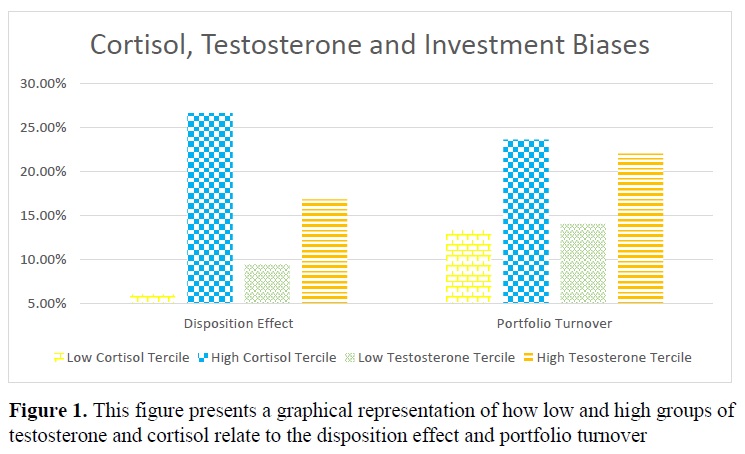Excerpt
Financial markets are full of pricing anomalies, and their existence is often explained by human behavior. Behavioral finance postulates that cognitive irrationality is manifested in biases like the disposition effect (the tendency of people to sell assets that have increased in value, but keeping assets that have dropped in value in portfolio) or overconfidence bias (the tendency of people to be more confident in their own abilities). There are some papers which directly link investment decision making caused by these biases to actual physiology of investors (for example, a known impact of testosterone on investment performance). A new research paper written by Nofsinger, Patterson, and Shank examines not only testosterone but also cortisol levels of testing subjects and then compares their performance in a mock investment contest. Both hormones are strongly related to higher portfolio turnover and inability to accept losses, with cortisol levels even more significant than testosterone.
Author: Nofsinger, Patterson, Shank
Title: On the Physiology of Investment Biases: The Role of Cortisol and Testosterone
Link: https://papers.ssrn.com/sol3/papers.cfm?abstract_id=3546687
Abstract:
The underlying physiological mechanisms of biases are not well understood. As such, we examine the impact of testosterone and cortisol levels on several commonplace investment biases using realistic trading simulations. Cortisol, the biological marker of stress, is positively related to the disposition effect and portfolio turnover, which is consistent with the relation between judgment errors and stress in social settings. Testosterone, the male hormone, is also positively related to portfolio turnover, which is consistent with androgen-driven behaviors. Overall, the results show that the endocrine system plays a significant role during financial decision-making, that has important consequences for the financial industry.
Notable quotations from the academic research paper:
“Behavioral finance consistently shows that irrational decisions stem from cognitive errors and behavioral biases. For example, the disposition effect describes the situation in which investors hold on to underperforming assets for too long and sell overperforming assets too soon, resulting in diminished portfolio performance.
Behavioral biases appear to persist over time, even when those biases result in lower returns. One source of those cognitive errors is the individual’s underlying biological makeup. The psychobiological mechanisms underlying the disposition effect, portfolio turnover, and the vast majority of documented investment biases have rarely been studied. The related medical literature suggests that steroid hormones – notably testosterone and cortisol – play an important role in risk-reward decisions. This is particularly important in the finance industry, given that it is still very much a male-dominated, androgen-driven field, and given research showing that occupational stress is very high among finance professionals.

Visit Quantpedia to read the full article:
https://quantpedia.com/a-link-between-investment-biases-and-cortisol-and-testosterone-levels/
Disclosure: Interactive Brokers Third Party
Information posted on IBKR Campus that is provided by third-parties does NOT constitute a recommendation that you should contract for the services of that third party. Third-party participants who contribute to IBKR Campus are independent of Interactive Brokers and Interactive Brokers does not make any representations or warranties concerning the services offered, their past or future performance, or the accuracy of the information provided by the third party. Past performance is no guarantee of future results.
This material is from Quantpedia and is being posted with its permission. The views expressed in this material are solely those of the author and/or Quantpedia and Interactive Brokers is not endorsing or recommending any investment or trading discussed in the material. This material is not and should not be construed as an offer to buy or sell any security. It should not be construed as research or investment advice or a recommendation to buy, sell or hold any security or commodity. This material does not and is not intended to take into account the particular financial conditions, investment objectives or requirements of individual customers. Before acting on this material, you should consider whether it is suitable for your particular circumstances and, as necessary, seek professional advice.















Join The Conversation
For specific platform feedback and suggestions, please submit it directly to our team using these instructions.
If you have an account-specific question or concern, please reach out to Client Services.
We encourage you to look through our FAQs before posting. Your question may already be covered!